Over 220 Russian soldiers surrender through 'I want to live' hotline

More than 220 Russian soldiers have surrendered to Ukraine via the "I Want to Live" hotline as of December, the Financial Times reported on Jan. 4, citing Vitalii Matviienko, spokesperson for Ukraine's military intelligence (HUR) prisoners of war department.
Launched in September 2022 by the HUR, the 24-hour hotline helps Russian troops surrender themselves or their units to the Ukrainian military. Ukraine promises Russian military personnel that they will be held in compliance with the Geneva Conventions after surrender.
Another 1,000 requests for surrender are pending, added Matviienko.
The hotline and associated Telegram chatbot have received more than 26,000 calls since it was first opened, and its website has been visited more than 48 million times. It was blocked shortly after its launch in Russia but remains accessible through the use of a VPN.
One of the most high-profile defections of a Russian soldier occurred with the assistance of the HUR in August 2023, when a Russian pilot named Maksim Kuzminov surrendered along with his Mi-8 helicopter.
Days later, the HUR announced Kuzminov would receive the hryvnia equivalent of $500,000 (approximately Hr 18.48 million) as a reward. Ukraine's parliament passed a law in April 2022 offering up to $1 million to Russian military personnel who manage to transfer equipment to Ukraine, depending on the type of equipment they hand over.
Following the news of Kuzminov's surrender, calls to I Want to Live increased by 70% in one day, the HUR said.
Some soldiers who surrendered via the hotline have remained in Ukraine. The helicopter pilot is reportedly settled in Ukraine with his family, who were also evacuated from Russia.
In other cases, Russian prisoners can be used to help facilitate exchanges, such as the large-scale exchange on Jan. 3 that saw 230 Ukrainian POWs return home.














